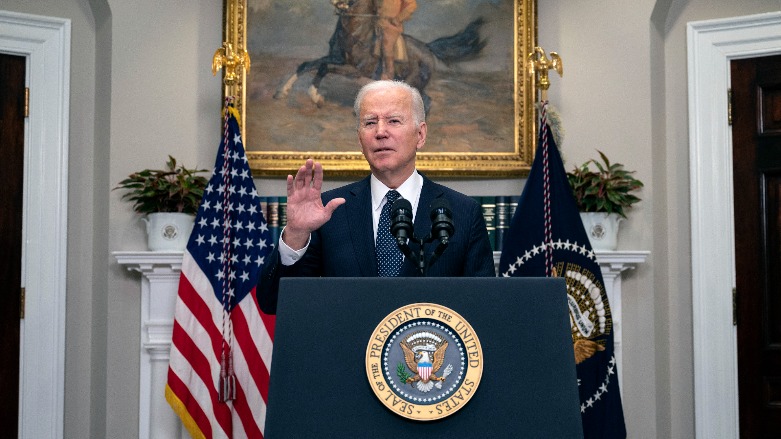Joe Biden: Russia will attack Ukraine in 'coming days;’ target will be Kiev

WASHINGTON DC (Kurdistan 24) – In a brief, televised address late on Friday afternoon, US President Joe Biden stated that Russian President Vladimir Putin has decided to attack Ukraine.
The target of the Russian assault will be Kyiv, Ukraine’s capital, Biden said, and the attack will occur “in the coming week—in the coming days.”
Biden’s address marked the first time that any senior US official has said that Putin has made up his mind to attack Ukraine. Until now, US officials had said that Putin had yet to make a final decision.
Nonetheless, US Secretary of State Antony Blinken and Russian Foreign Minister Sergey Lavrov are scheduled to meet on Thursday in Europe—if Russia does not attack Ukraine before then.
Given the timeline that Biden laid out, however, there is some chance that the meeting will not occur.
Biden’s address followed a conference call he held earlier on Friday with ten other senior figures from NATO or the European Union: the leaders of Canada, France, Germany, Poland, and Romania, as well as NATO’s Secretary General, and the Presidents of the European Commission and European Council.
Presumably, what Biden told those leaders was quite similar to what he later said publicly.
Implications for Kurds
The Kurdistan Regional Government (KRG) was established in 1992. In the three decades since, relations between Washington and Moscow have been relatively amicable—compared to the historical norm—specifically, the decades that followed the end of World War II.
That period—from 1945 until the collapse of the Soviet Union in 1991—is known as the “Cold War.” This marks the first time that the KRG is operating in an atmosphere of such high tension between the two powers.
During the Cold War, the rivalry between the US and Soviet Union dominated international politics. Everything else was decidedly secondary.
The two superpowers did not fight each other directly—hence “Cold War,” but conducted their rivalry by supporting proxy forces.
Indeed, a major factor in the collapse of the Soviet Union was the covert support the US and its allies, including Pakistan, Egypt, and Saudi Arabia, provided to the Afghan mujahideen, after Moscow invaded Afghanistan in 1979.
A similar dynamic may be emerging now. Russia is closely aligned with Syria, which, since 2003, has supported Sunni terrorists in Iraq, when it served its interests to do so.
There is significant reason to suspect that the Syrian regime, perhaps encouraged by Russia, was behind ISIS in its assault three weeks ago on the al-Sina’a prison in Hasakah.
It was a spectacular attack that exceeded both local and Coalition estimates of ISIS’s capabilities. The most obvious explanation for ISIS’s unanticipated prowess is that it had external support.
Read More: Ukraine Crisis: Implications for the Middle East, including the US, Rojava, and the Kurdistan Region
Thus, a new danger may well be emerging. Quite possibly, Syria, in coordination with Russia, will step up its support for ISIS, increasing the threat which the terrorist group poses to all those parties in the region that are aligned with the US: the area of northeast Syria administered by the Autonomous Administration of North and East Syria (AANES), the Kurdistan Region of Iraq, as well as Iraq proper.
If that were to happen, it would be little more than a reversion to what was customary practice during the Cold War.
